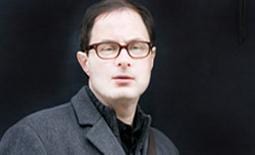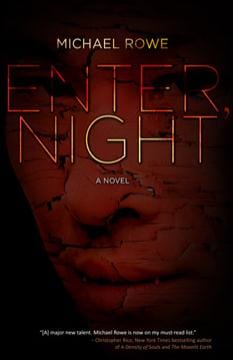Michael Rowe, award-winning queer journalist, essayist and editor, recently published his first novel, Enter, Night, featuring voracious vampires and gay mortals.
But wait – “Enter, Night is not a gay vampire novel,” says Rowe. “There is a gay character in it and a closeted character.”
In the northern Ontario mining town of Parr’s Landing, 17-year-old protagonist Jeremy Parr has a fling with pal Elliott McKitrick. When Jeremy’s mother, Adeline, discovers their secret, she immediately ships Jeremy off for six months of gay aversion treatment, including electroshock therapy and counselling.
Years pass and Jeremy, now 25, returns home. Elliott has become a respectably heterosexual police constable, and Jeremy attempts to reconcile with him in heartbreaking scenes reminiscent of Thomas Wolfe’s You Can’t Go Home Again and Annie Proulx’s Brokeback Mountain.
“I’ve certainly known guys like Elliott’s character,” Rowe says. “They’re very, very difficult. You don’t want to fall in love with those guys because they really will break your heart in the worst possible sense.”
As for the fiercely loyal Jeremy, Rowe explains, “I was never a Jeremy, but I’ve known guys like that.”
Rowe says his description of early-1960s gay aversion therapy is based on fact. “The idea that anyone would do that . . . was just deeply chilling,” he says.
Rowe worked closely with co-publisher Brett Alexander Savory, of ChiZine Publications, a small Canadian horror press, and penned Enter, Night over nine months. He calls it a “very deliberate, unabashed 1970s vampire novel.”
Delightfully reminiscent of Stephen King’s Salem’s Lot, the book teems with charged sexuality, both queer and heterosexual, elicited by the vampires.
Before tackling the book, Rowe was a regular contributor to The Huffington Post, often writing about public figures who make anti-gay comments, such as Sarah Palin, Ann Coulter and Carrie Prejean. But Rowe is by no means new to horror. A long-time Canadian correspondent for US horror magazine Fangoria, Rowe also, perhaps most notably, edited the Queer Fear series of horror anthologies, which changed the landscape of gay horror fiction.
Novelist Lee Thomas says Queer Fear paved the way for much of his own work. “Like the queer content in Clive Barker’s Books of Blood, the stories don’t pander or apologize or defend queer life; they just include it in great stories,” Thomas says.
In fact, openly gay horror icon Barker has himself dubbed Queer Fear as groundbreaking.
“If you’re a queer artist of any kind, it is wonderful to be able to do something nobody else has done,” Rowe says. “It was a tremendous time to be queer and into horror and make a declarative statement. ‘Hey, guess what, guys? We’re here too. And horror is about us as well. We’re just not monsters, although we can be very effective monsters when we want to be.’”
Rowe’s 2006 novella, In October, featured familiar monsters — homophobic high-school bullies. They torment the gay protagonist until he casts a revenge spell and fights back. In October still resonates given recent media coverage of gay teen suicides in North America.
Rowe found other real-life inspiration in Bram Stoker’s Dracula, which Rowe’s mother bought him when the public library refused to loan it to him. His porous 10-year-old imagination eagerly absorbed the vampire imagery.
Although a resident of Toronto’s Cabbagetown neighbourhood since 1981, Rowe was born in Ottawa. Here he found inspiration in early-1970s comic books. He and his friends snapped up Marvel Comics’ The Tomb of Dracula at the local drugstore.
“We followed those stories the same way that kids today follow Harry Potter stories,” Rowe says.
He particularly adored Tomb writer Marv Wolfman, creator of Blade and The New Teen Titans.
“In many ways, Marv Wolfman was my predominant influence as a writer,” Rowe says. “For my influences on this book, look at those things as the sources of the inspiration rather than Stephen King.
“Certainly, Enter, Night is homage to that wonderful period where we read these comics and that was our life.”



 Why you can trust Xtra
Why you can trust Xtra


